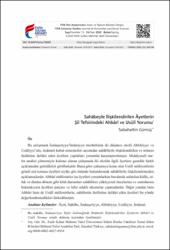Sahâbeyle İlişkilendirilen Âyetlerin Şiî Tefsirindeki Ahbârî ve Usûlî Yorumu
Citation
GÜMÜŞ, Sabahattin. "Sahâbeyle İlişkilendirilen Âyetlerin Şiî Tefsirindeki Ahbârî ve Usûlî Yorumu." FSM İlmî Araştırmalar İnsan ve Toplum Bilimleri Dergisi, 15 (2020): 299-340.Abstract
Bu çalışmada İsnâaşeriyye/İmâmiyye mezhebinin iki düşünce ekolü Ahbâriyye ve
Usûliyye’nin, imâmeti kabul etmemeleri açısından sahâbîlerle ilişkilendirilen ve onların
fazîletine delâlet eden âyetlere yaptıkları yorumlar karşılaştırılmıştır. Mukâyeseli metin
analizi yöntemiyle kaleme alınan çalışmada iki ekolün ilgili âyetlere genelde farklı
açıklamalar getirdikleri görülmüştür. Buna göre çalışmaya konu olan Usûlî müfessirlerin
geneli söz konusu âyetleri siyâkı göz önünde bulundurarak sahâbîlerle ilişkilendirmeden
açıklamışlardır. Ahbârî müfessirler ise âyetleri yorumlarken buralarda anlatılan küfür, nifak
ve dinden dönme gibi kötü durumları sahâbîlere yükleyerek öncelerine ve sonralarına
bakmaksızın âyetlere parçacı ve lafız odaklı okumalar yapmışlardır. Diğer yandan hem
Ahbâri hem de Usûlî müfessirlerin, sahâbenin fazîletine delâlet eden âyetleri bu yönde
değerlendirmedikleri farkedilmiştir. In this study, two schools of thought under the school of Ithnaashariyyah/Imamiyyah;
Al-Akhbariyyah and Al-Usuliyyah were compared from the perspective of their disclamation
of Imamate and their interpretations on the verses associated with the companions.
In the study which was conducted through the comparative textual analysis, it is found out
that both of the schools of thought generally bring forward different interpretations on the
related verses. According to this, the interpreters (mufasser) from the perspective of the
“Usul” interpreted the mentioned verses by considering seyaq, without associating them
with the companions. However, the Akhbari interpreters assumed the blasphemy (kufr),
hypocrisy (nifaq), apostasy (irtidad) to the companions without considering the seyaq and
sebaq of the verse and interpreted the verses partially and word-oriented. On the other
hand, it was realized that both Akhbari and Usuli interpreters (mufasser) did not evaluated
the verses indicating the virtue of the Companions in this sense.



















